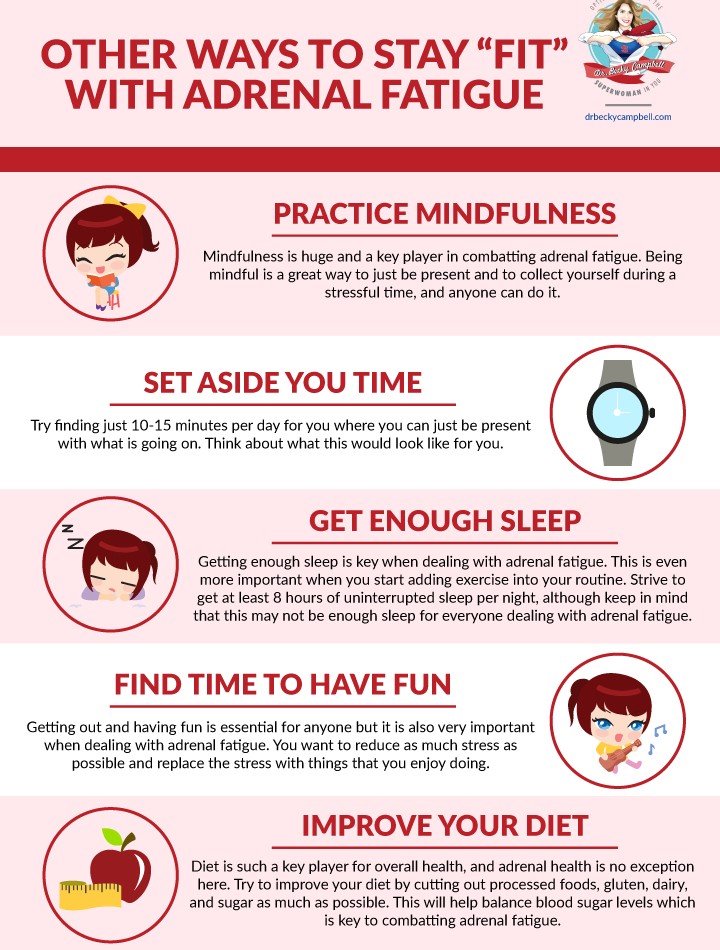Are you constantly feeling exhausted, stressed, and struggling to get through the day? If so, you may be experiencing adrenal fatigue. The good news is that there are effective strategies available to help you recover and regain your energy. In this article, we will explore some tried and tested techniques that can support your adrenal fatigue recovery journey, allowing you to feel more vibrant and revitalized. Get ready to discover practical tips and empowering insights that will help you overcome adrenal fatigue and reclaim your vitality.
Lifestyle Changes
Stress Management
Stress is a common factor in our daily lives, but it can take a toll on our adrenal glands and overall well-being. To help recover from adrenal fatigue, it’s important to prioritize stress management techniques. One effective strategy is to identify and address the sources of stress in your life. Take a moment to assess your daily routine and identify any stressors that may be contributing to your adrenal fatigue. Once you’ve identified these stressors, you can take steps to reduce or eliminate them from your life. This may involve setting boundaries, practicing self-care, and seeking support from loved ones or professionals.
Sleep Hygiene
Quality sleep is crucial for adrenal fatigue recovery. Lack of sleep or poor sleep can further exhaust your adrenal glands and compromise your overall health. To improve sleep hygiene, establish a regular sleep schedule by going to bed and waking up at the same time every day, even on weekends. Create a relaxing bedtime routine, such as taking a warm bath, reading a book, or listening to calming music. Make your sleep environment conducive to restful sleep by keeping the room cool, dark, and quiet. Avoid stimulating activities and electronic screens before bed, as they can interfere with your ability to fall asleep.
Exercise
Regular exercise is not only beneficial for physical health but also plays a crucial role in adrenal fatigue recovery. Engaging in moderate exercise, such as walking, swimming, or cycling, can help reduce stress levels, improve sleep quality, and boost mood. However, it’s important to find a balance and avoid excessive exercise, as this can further strain your adrenal glands. Consult with a healthcare practitioner or a holistic health coach to determine the appropriate intensity and duration of exercise that suits your individual needs.
Nutrition
Proper nutrition is essential for supporting adrenal fatigue recovery. Focus on consuming a balanced diet that includes a variety of fruits, vegetables, whole grains, lean proteins, and healthy fats. Avoid or limit the intake of caffeine, sugar, processed foods, and alcohol, as these can contribute to adrenal fatigue symptoms. Be sure to stay hydrated by drinking plenty of water throughout the day. Consider incorporating stress-reducing foods and supplements into your diet, such as herbal adaptogens, vitamin C, B-complex vitamins, magnesium, and omega-3 fatty acids. Consulting with a healthcare practitioner or a naturopathic doctor can provide personalized guidance on the best nutrition plan for your adrenal fatigue recovery.
Supportive Therapies
Herbal Adaptogens
Herbal adaptogens are natural substances that help the body adapt to stress and promote overall well-being. These powerful herbs, such as ashwagandha, rhodiola, and holy basil, can support adrenal gland function and help regulate cortisol levels. Incorporating adaptogens into your daily routine, either through herbal teas, tinctures, or supplements, can provide significant benefits in managing adrenal fatigue symptoms. However, it’s important to consult with a healthcare practitioner or a naturopathic doctor before introducing any new herbs or supplements into your regimen to ensure they are suitable for your individual needs.
Hydrotherapy
Hydrotherapy, which involves the therapeutic use of water, can be a valuable supportive therapy for adrenal fatigue recovery. Hydrotherapy techniques, such as contrast showers, cold compresses, and foot baths, can help improve circulation, reduce inflammation, and promote relaxation. Consider incorporating hydrotherapy into your self-care routine to enhance your overall well-being. However, if you have any underlying health conditions or concerns, it’s best to consult with a healthcare practitioner or a naturopathic doctor before starting any hydrotherapy practices.
Acupuncture
Acupuncture is an ancient Chinese practice that involves the insertion of thin needles into specific points on the body. This therapy can help restore balance and alleviate symptoms associated with adrenal fatigue. Acupuncture promotes relaxation, reduces stress, and improves energy flow throughout the body. By stimulating specific points, acupuncture can support adrenal gland function and aid in adrenal fatigue recovery. If you’re considering acupuncture, consult with a qualified practitioner who specializes in adrenal fatigue or holistic wellness.
Aromatherapy
Aromatherapy is the use of essential oils extracted from plants to promote health and well-being. Certain essential oils, such as lavender, chamomile, and bergamot, have calming properties that can help reduce stress, enhance sleep quality, and alleviate adrenal fatigue symptoms. You can incorporate aromatherapy into your daily routine by using essential oils in a diffuser, adding them to a warm bath, or applying them topically (diluted with a carrier oil). It’s important to choose high-quality essential oils and consult with a qualified aromatherapist for personalized recommendations.
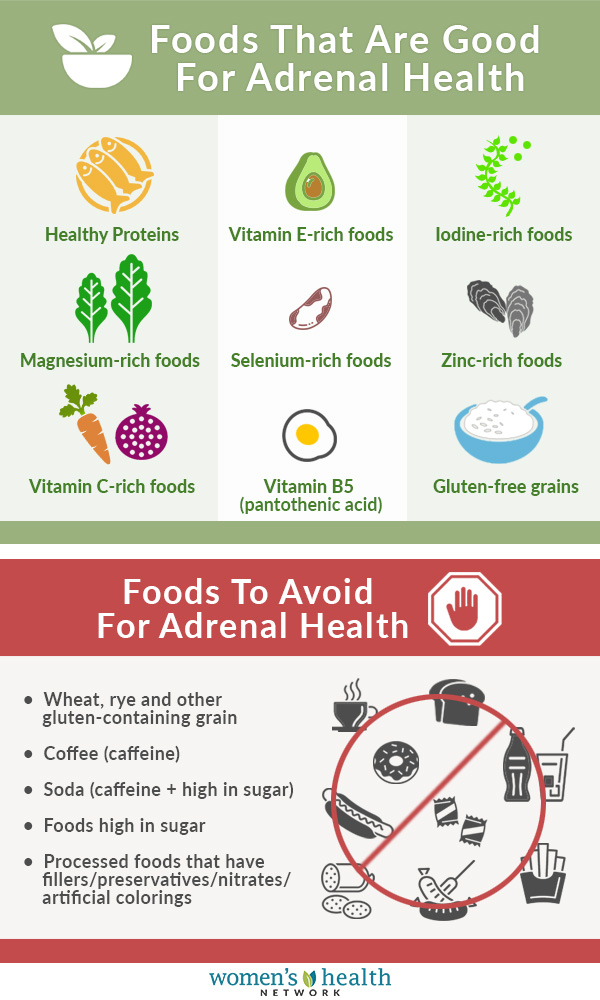
This image is property of www.womenshealthnetwork.com.
Supplements
Vitamin C
Vitamin C is a powerful antioxidant that plays a crucial role in supporting adrenal gland function and reducing oxidative stress. Adequate vitamin C intake can help regulate cortisol levels and support the overall recovery of the adrenal glands. Incorporate vitamin C-rich foods into your diet, such as citrus fruits, berries, bell peppers, and leafy greens. If needed, you can also consider taking a vitamin C supplement, but consult with a healthcare practitioner to determine the appropriate dosage for your individual needs.
B-complex Vitamins
B-complex vitamins, including B1, B2, B3, B5, B6, B7, B9, and B12, are essential for energy production, proper nervous system function, and adrenal gland health. These vitamins work synergistically to support adrenal fatigue recovery and overall well-being. You can obtain B-complex vitamins from a variety of sources, such as whole grains, legumes, leafy greens, eggs, and lean meats. In some cases, a healthcare practitioner or a naturopathic doctor may recommend B-complex supplements to ensure adequate intake and address any deficiencies.
Magnesium
Magnesium is a mineral that plays a vital role in numerous bodily functions, including muscle relaxation, stress reduction, and energy production. In the context of adrenal fatigue, magnesium supplementation can help relieve muscle tension, promote better sleep, and support adrenal gland function. Incorporate magnesium-rich foods into your diet, such as leafy greens, nuts, seeds, and legumes. If necessary, consult with a healthcare practitioner to determine the appropriate dosage and form of magnesium supplementation for your individual needs.
Omega-3 Fatty Acids
Omega-3 fatty acids, particularly EPA (eicosapentaenoic acid) and DHA (docosahexaenoic acid), are essential fats that play a crucial role in brain health, inflammation reduction, and hormonal balance. These healthy fats have been shown to support adrenal function and reduce the symptoms of adrenal fatigue. You can obtain omega-3 fatty acids from fatty fish (such as salmon and sardines), flaxseeds, chia seeds, and walnuts. If you struggle to include enough omega-3-rich foods in your diet, consider taking a high-quality fish oil or algae-based omega-3 supplement, but consult with a healthcare practitioner to determine the most suitable form and dosage for your needs.
Hormonal Balance
Addressing Cortisol Imbalance
Cortisol, often referred to as the “stress hormone,” is a crucial hormone produced by the adrenal glands. In the context of adrenal fatigue, cortisol levels can become dysregulated and either too high or too low. To achieve hormonal balance, it’s important to address cortisol imbalance. Strategies such as stress management techniques, sleep hygiene practices, and adaptogenic herbs can be beneficial in regulating cortisol levels. However, it’s essential to consult with a healthcare practitioner or a naturopathic doctor who specializes in hormonal health to determine the most appropriate approach for your individual needs.
Supporting DHEA Production
DHEA (dehydroepiandrosterone) is a precursor hormone to estrogen and testosterone. Adequate DHEA levels are essential for hormonal balance and overall well-being. To support DHEA production, focus on stress management techniques, regular exercise, and a nutrient-dense diet. Adaptogenic herbs can also play a role in supporting DHEA production. However, it’s important to consult with a healthcare practitioner or a naturopathic doctor to assess your DHEA levels and determine the most appropriate strategies for your individual needs.
Balancing Thyroid Function
The thyroid gland plays a vital role in regulating metabolism and hormonal balance. Adrenal fatigue can often impact thyroid function, leading to symptoms such as fatigue, weight changes, and mood disturbances. To address thyroid imbalances, it’s important to support overall adrenal fatigue recovery through stress management, proper nutrition, and lifestyle changes. Additionally, consulting with a healthcare practitioner or a naturopathic doctor is crucial for thorough evaluation of thyroid function and the development of a personalized treatment plan.
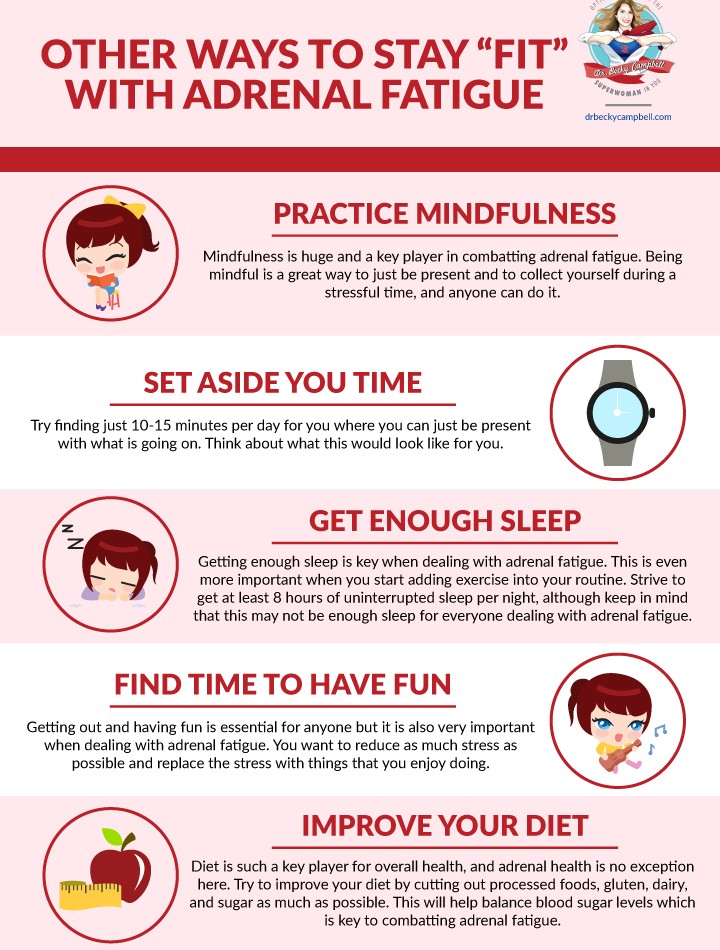
This image is property of drbeckycampbell.com.
Detoxification
Liver Support
The liver is responsible for detoxifying the body and plays a crucial role in adrenal fatigue recovery. To support liver function, focus on consuming a nutrient-dense diet that includes liver-friendly foods such as leafy greens, cruciferous vegetables, garlic, and turmeric. Hydration is also important for liver health, so be sure to drink plenty of water throughout the day. Consult with a healthcare practitioner or a naturopathic doctor to discuss the appropriateness of liver-supportive herbs or supplements for your individual needs.
Gut Healing
The health of our gut directly impacts our overall well-being, including adrenal function. To promote gut healing, incorporate foods rich in fiber, such as fruits, vegetables, whole grains, and legumes. Prioritize the consumption of fermented foods like sauerkraut, kimchi, and kefir, as they contain beneficial probiotics that support a healthy gut microbiome. In some cases, a healthcare practitioner or a naturopathic doctor may recommend additional gut healing protocols, such as targeted supplements or specific dietary modifications.
Emotional Detoxification
Emotional well-being is an integral part of adrenal fatigue recovery. Emotional detoxification involves identifying and releasing emotional burdens that may contribute to stress and imbalances. This process can be facilitated through therapy, counseling, mindfulness practices, and journaling. Seeking support from a mental health professional or joining support groups can also provide valuable tools for emotional healing. Remember, addressing emotional health is just as important as addressing physical health when recovering from adrenal fatigue.
Stress Reduction Techniques
Meditation
Meditation is a powerful technique for reducing stress, promoting relaxation, and supporting adrenal fatigue recovery. Find a quiet and comfortable space, close your eyes, and focus your attention on your breath or a specific object. Allow your thoughts to come and go without judgement. By practicing meditation regularly, even for just a few minutes a day, you can cultivate a sense of inner calm and enhance your overall well-being.
Deep Breathing
Deep breathing exercises are a simple and effective way to activate the body’s relaxation response and reduce stress levels. Practice deep belly breathing by inhaling deeply through your nose, letting your abdomen expand, and exhaling slowly through your mouth. You can also try alternate nostril breathing, box breathing, or other breathing techniques. Incorporating deep breathing into your daily routine, especially during stressful moments, can help calm your mind and support adrenal fatigue recovery.
Yoga
Yoga combines physical movement, breathwork, and mindfulness to promote relaxation, reduce stress, and improve overall well-being. Regular yoga practice can help strengthen the body, increase flexibility, and restore balance to the adrenal glands. Choose gentle or restorative yoga styles that focus on relaxation and stress reduction. Consider attending yoga classes or following online tutorials guided by qualified instructors to ensure safe and effective practice.
Journaling
Journaling is a therapeutic practice that allows you to express your thoughts, emotions, and experiences on paper. By regularly writing in a journal, you can gain insights into your inner world, release stress, and improve self-awareness. Consider dedicating a few minutes each day to write freely without judgement or censorship. You can reflect on your experiences, express gratitude, or set intentions for the day. Journaling can be a valuable tool in managing stress and supporting overall well-being.
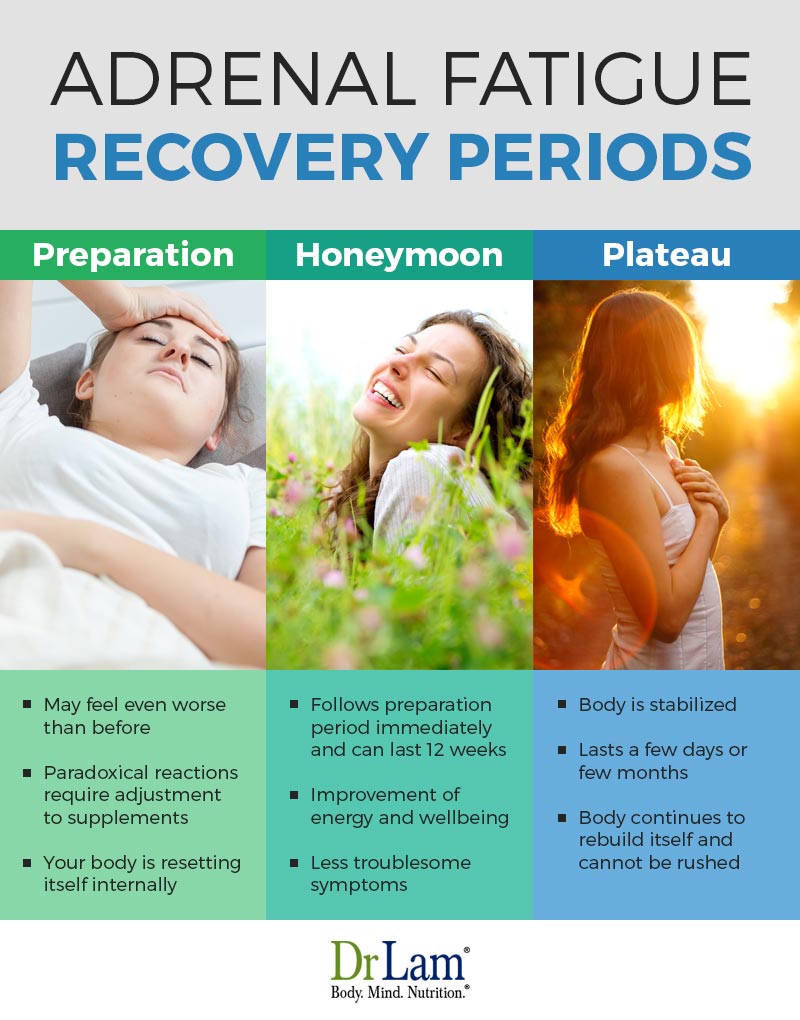
This image is property of www.drlamcoaching.com.
Emotional Support
Counseling or Therapy
Seeking professional counseling or therapy can provide invaluable support during your adrenal fatigue recovery journey. A licensed therapist or counselor can help you explore the emotional aspects of your condition and develop effective coping strategies. Through therapy, you can gain insights into patterns, behavior, and emotions, as well as learn healthy ways to manage stress and improve overall well-being. It’s important to find a therapist who specializes in adrenal fatigue or has experience working with individuals recovering from chronic health conditions.
Support Groups
Connecting with others who are going through similar experiences can provide a sense of validation, understanding, and support. Consider joining support groups, either in-person or online, dedicated to adrenal fatigue or chronic health conditions. These groups can offer a safe space for sharing and learning from others’ experiences, as well as provide valuable resources and coping strategies. Engaging with a supportive community can help alleviate feelings of isolation and provide emotional support throughout your adrenal fatigue recovery journey.
Self-Care Practices
Self-care is essential for maintaining mental, emotional, and physical well-being. Take time each day to nurture and prioritize yourself. Engage in activities that bring you joy, relaxation, and rejuvenation. This can include hobbies, spending time in nature, practicing mindfulness, taking warm baths, or indulging in a favorite book or movie. Remember, self-care is an individual practice, so choose activities that resonate with you and make them a consistent part of your routine. By prioritizing self-care, you can better manage stress and support your overall adrenal fatigue recovery.
Stressful Situation Management
Boundaries and Prioritization
Setting healthy boundaries and learning to prioritize your needs are crucial for managing stressful situations and preventing adrenal fatigue from worsening. Take a step back and assess your commitments, responsibilities, and relationships. Learn to say “no” when necessary and delegate tasks to others if possible. Understand that it’s okay to put yourself first and prioritize self-care and stress management in order to avoid becoming overwhelmed. By establishing healthy boundaries and focusing on what truly matters, you can better manage stress and support your adrenal fatigue recovery.
Time Management
Effective time management is essential for maintaining balance and preventing stress overload. Prioritize your tasks and allocate specific time slots for each activity. Avoid overcommitting and learn to delegate or eliminate non-essential tasks. Make use of productivity tools such as calendars, to-do lists, and reminder apps to help you stay organized and focused. By managing your time effectively, you can reduce stress and create more space for relaxation and self-care.
Delegating and Asking for Help
It’s common to feel overwhelmed when dealing with adrenal fatigue recovery and other responsibilities. Don’t hesitate to ask for help and delegate tasks to others when needed. Reach out to supportive friends, family members, or colleagues who can assist you with daily responsibilities or provide emotional support. Remember, asking for help is a sign of strength, and accepting assistance can reduce stress and support your overall well-being.
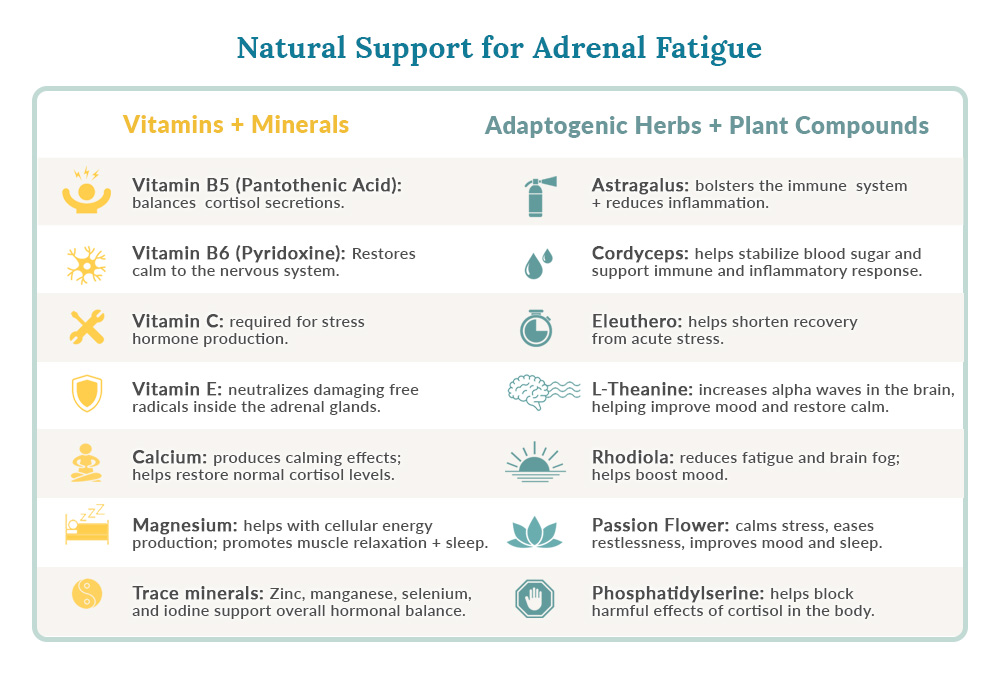
This image is property of www.womenshealthnetwork.com.
Professional Guidance
Consulting with a Healthcare Practitioner
When experiencing adrenal fatigue, it’s important to consult with a qualified healthcare practitioner who can assess your overall health and guide you through the recovery process. A healthcare practitioner, such as a conventional medical doctor or an integrative medicine practitioner, can help identify any underlying health conditions, order appropriate lab tests, and provide personalized recommendations for adrenal fatigue recovery. They may also collaborate with other professionals, such as naturopathic doctors or holistic health coaches, to ensure comprehensive and tailored care.
Working with a Naturopathic Doctor
Naturopathic doctors specialize in holistic approaches to health and wellness. They are trained to address the underlying causes of health conditions, including adrenal fatigue, and provide personalized treatment plans that consider the whole person. A naturopathic doctor can guide you in implementing lifestyle changes, nutritional strategies, and appropriate supplementation to support your adrenal fatigue recovery. They may also offer supportive therapies and recommend natural remedies to promote overall well-being.
Seeking a Holistic Health Coach
A holistic health coach can play a valuable role in supporting adrenal fatigue recovery. These professionals focus on collaborating with individuals to create sustainable lifestyle changes that support overall well-being. A health coach can provide guidance, accountability, and tools for stress management, nutrition, exercise, and other aspects of adrenal fatigue recovery. By working with a holistic health coach, you can develop personalized strategies and gain the necessary support to achieve your health goals.
Lifestyle Enhancements
Establishing Regular Daily Routine
Establishing a regular daily routine can provide structure and stability during adrenal fatigue recovery. Aim to wake up and go to bed at consistent times to support a healthy sleep-wake cycle. Plan your meals, exercise, and self-care activities at regular intervals throughout the day. Incorporate stress management techniques, such as meditation or deep breathing, into your routine to promote relaxation. By following a regular daily routine, you can optimize your energy levels, reduce stress, and support adrenal fatigue recovery.
Creating a Supportive Environment
Create an environment that nurtures relaxation, joy, and overall well-being. Declutter your living and workspaces to promote a sense of calm and reduce stress. Surround yourself with positive affirmations, plants, and natural elements that bring you comfort and peace. Consider incorporating relaxation techniques, such as aromatherapy or soft lighting, into your environment. By creating a supportive physical space, you can enhance your overall well-being and recovery from adrenal fatigue.
Cultivating Healthy Relationships
Nurturing healthy relationships is essential for managing stress and supporting adrenal fatigue recovery. Surround yourself with individuals who uplift, support, and understand your journey. Express your needs and concerns to loved ones and seek their understanding and support. Cultivate open and honest communication with those closest to you and create boundaries when necessary. By fostering healthy relationships, you can navigate the challenges of adrenal fatigue recovery with the support and love of others.
In conclusion, recovering from adrenal fatigue requires a comprehensive approach that includes lifestyle changes, supportive therapies, supplements, hormonal balance, detoxification, and stress reduction techniques. By implementing these strategies and seeking professional guidance, you can support your adrenal glands, manage stress, and ultimately enhance your overall well-being. Remember, every individual experience of adrenal fatigue is unique, so tailor these strategies to meet your specific needs and consult with healthcare professionals to ensure a safe and effective recovery journey.
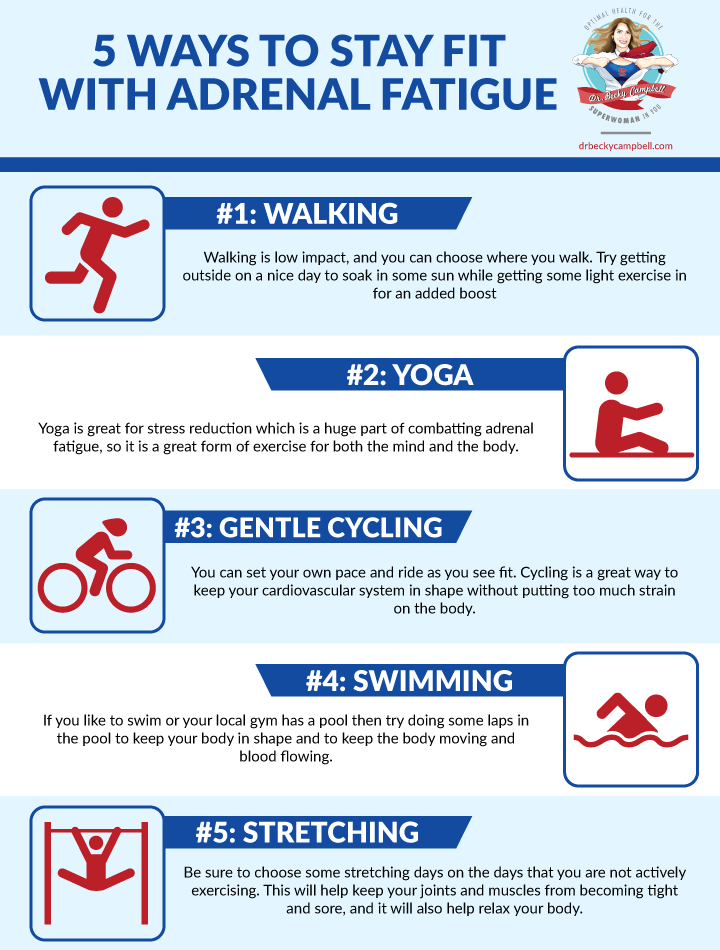
This image is property of drbeckycampbell.com.

